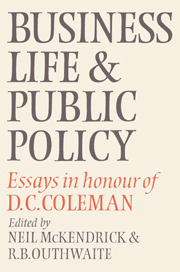Book contents
- Frontmatter
- Contents
- Preface
- List of contributors
- 1 Piscatorial politics in the early Parliaments of Elizabeth I
- 2 Marriage as business: opinions on the rise in aristocratic bridal portions in early modern England
- 3 Age and accumulation in the London business community, 1665–1720
- 4 The use and abuse of credit in eighteenth-century England
- 5 Convicts, commerce and sovereignty: the forces behind the early settlement of Australia
- 6 ‘Gentleman and Players’ revisited: the gentlemanly ideal, the business ideal and the professional ideal in English literary culture
- 7 The City, entrepreneurship and insurance: two pioneers in invisible exports – the Phoenix Fire Office and the Royal of Liverpool, 1800–90
- 8 ‘At the head of all the new professions’: the engineer in Victorian society
- 9 Bernard Shaw, Bertold Brecht and the businessman in literature
- 10 Lost opportunities: British business and businessmen during the First World War
- 11 Ideology or pragmatism? The nationalization of coal, 1916–46
- Bibliography of D. C. Coleman's published works
- Index
6 - ‘Gentleman and Players’ revisited: the gentlemanly ideal, the business ideal and the professional ideal in English literary culture
Published online by Cambridge University Press: 07 October 2009
- Frontmatter
- Contents
- Preface
- List of contributors
- 1 Piscatorial politics in the early Parliaments of Elizabeth I
- 2 Marriage as business: opinions on the rise in aristocratic bridal portions in early modern England
- 3 Age and accumulation in the London business community, 1665–1720
- 4 The use and abuse of credit in eighteenth-century England
- 5 Convicts, commerce and sovereignty: the forces behind the early settlement of Australia
- 6 ‘Gentleman and Players’ revisited: the gentlemanly ideal, the business ideal and the professional ideal in English literary culture
- 7 The City, entrepreneurship and insurance: two pioneers in invisible exports – the Phoenix Fire Office and the Royal of Liverpool, 1800–90
- 8 ‘At the head of all the new professions’: the engineer in Victorian society
- 9 Bernard Shaw, Bertold Brecht and the businessman in literature
- 10 Lost opportunities: British business and businessmen during the First World War
- 11 Ideology or pragmatism? The nationalization of coal, 1916–46
- Bibliography of D. C. Coleman's published works
- Index
Summary
Amongst the high seriousness, and indeed high solemnity, of much recent sociological writing, there has been one set of findings which must have brought a srnile to the face of most of its readers. This was Liam Hudson's assertion of a significant statistical correlation between the educational background of medical specialists and the parts of the body they specialized in. The smile must surely have broadened with each revelation. Specialists from English public schools tended to specialize in the parts above the waist rather than those below, on the surface of the body rather than its innards, on the living rather than the dead, and on the bodies of men rather than those of women. Specialists educated in the state system, on the other hand, tended to get the less status-packed parts of the poorer, less prestigious, sex. This is not, of course, to suggest a systematic social and educational hierarchy with Etonian surgeons operating solely on the brain surface of living males while their colleagues from the comprehensive school system delved dutifully into the nether regions of dead females. There is no suggestion either of an educationally predictable hierarchy of talent or expertise. The article is simply an amusing demonstration of the interaction between social and educational background and the subtle workings of career choice. Beyond the lighthearted observation there lies a very important point.
For status, prestige, class values, social and even aesthetic preferences powerfully, if not always obviously, influence our career choices.
- Type
- Chapter
- Information
- Business Life and Public PolicyEssays in Honour of D. C. Coleman, pp. 98 - 136Publisher: Cambridge University PressPrint publication year: 1986
- 7
- Cited by



